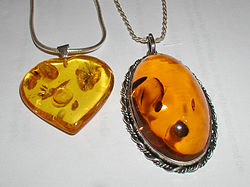 Amber is used to make jewelry, which has helped inspire that name. | |
| Gender | Female |
|---|---|
| Origin | |
| Word/name | from Arabic ʿanbarعنبر [1] [ better source needed ] (ultimately from Middle Persian ambar [2] ) via Middle Latin ambar and Middle French ambre. |
| Meaning | "amber" |
Amber is a feminine given name taken from amber, the fossilized tree resin that is often used in the making of jewelry. The word can also refer to a yellowish-orange color. [3]
Contents
The name was in occasional use in the early 1800s, according to United States census records. [4] It first came into regular use in the Anglosphere in the late 1800s along with other gemstone names popular during the Victorian era. It rose in popularity following the release of the 1944 historical romance novel Forever Amber by American author Kathleen Winsor. [5] Amber has been a popular name in most English speaking countries. In the United States, it ranked among the top 1,000 names at different points between 1880 and 1916 and again consistently between 1945 and 2024. It peaked in usage there in the 1990s, when it was the 20th most popular name in the United States. [6] It has ranked among the top 50 names for girls in England and Wales, Scotland, Ireland, Belgium, Australia and Canada in recent years. [7] Variants have also been popular in other countries, including Ámbar in Spanish, which is currently among the most popular names for girls in Argentina, Ambre in French, which was among the top 10 names for newborn girls in France in recent years, and the Italian Ambra, which was among the top 10 names for baby girls in Albania and among the top 50 names for newborn girls in Italy in recent years.
English elaborations of the name in use include Amberlee, Amberleigh, Amberley, Amberli, Amberlie, Amberlin, Amberlinn, Amberly, Amberlyn and Amberlynn, among others.